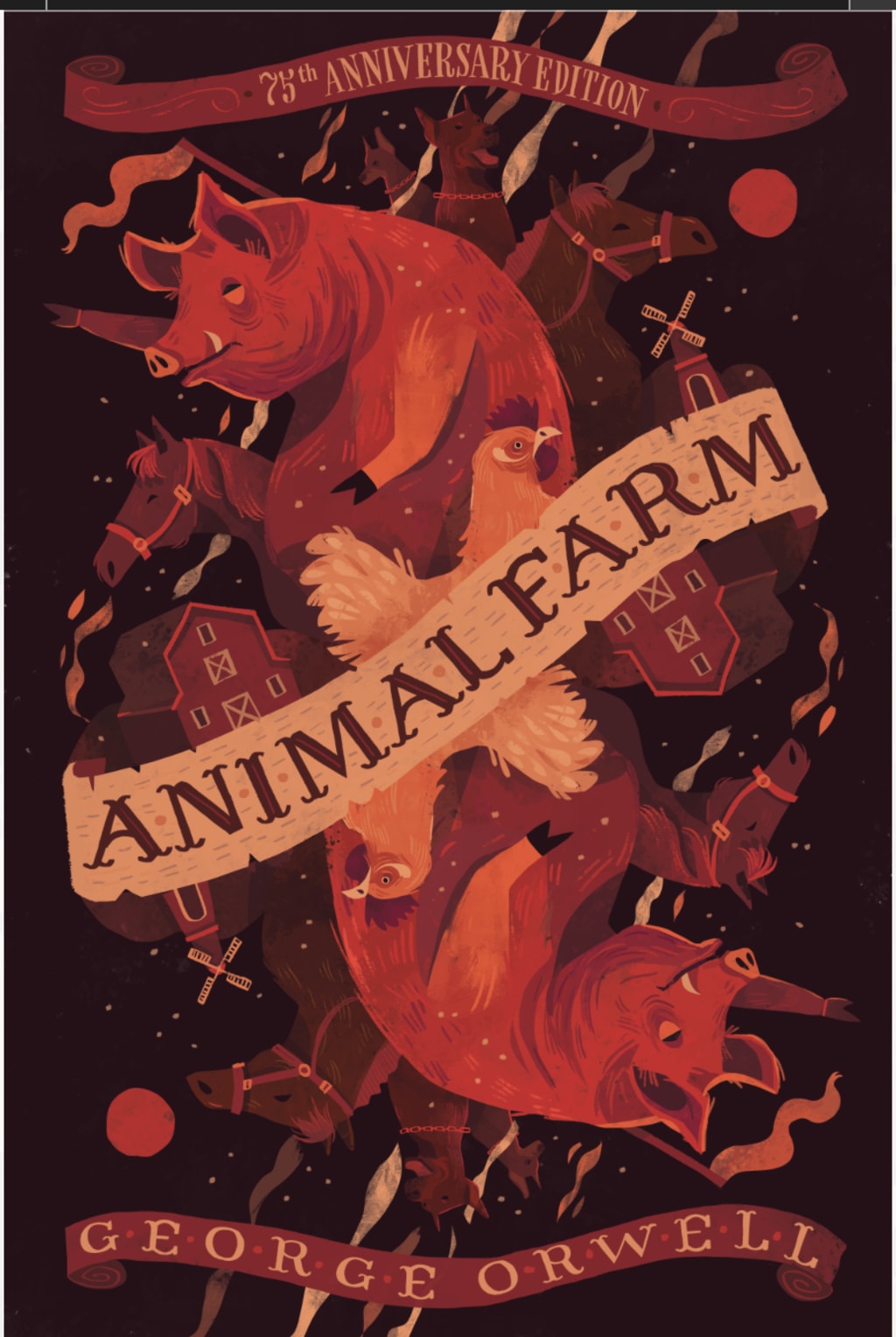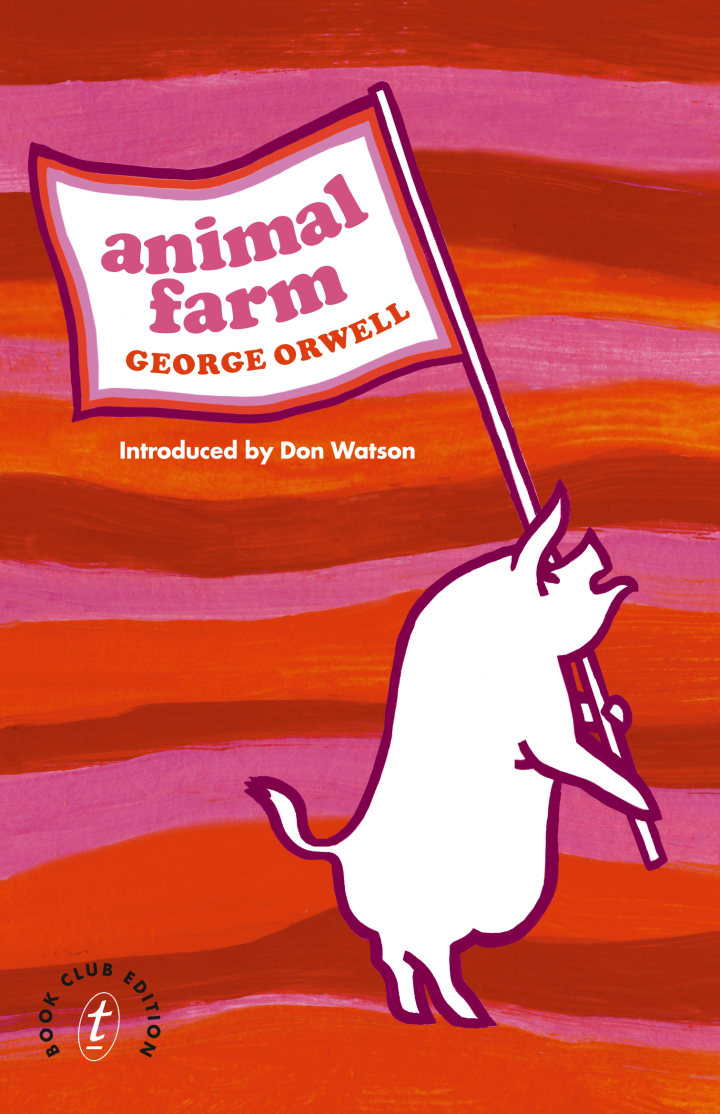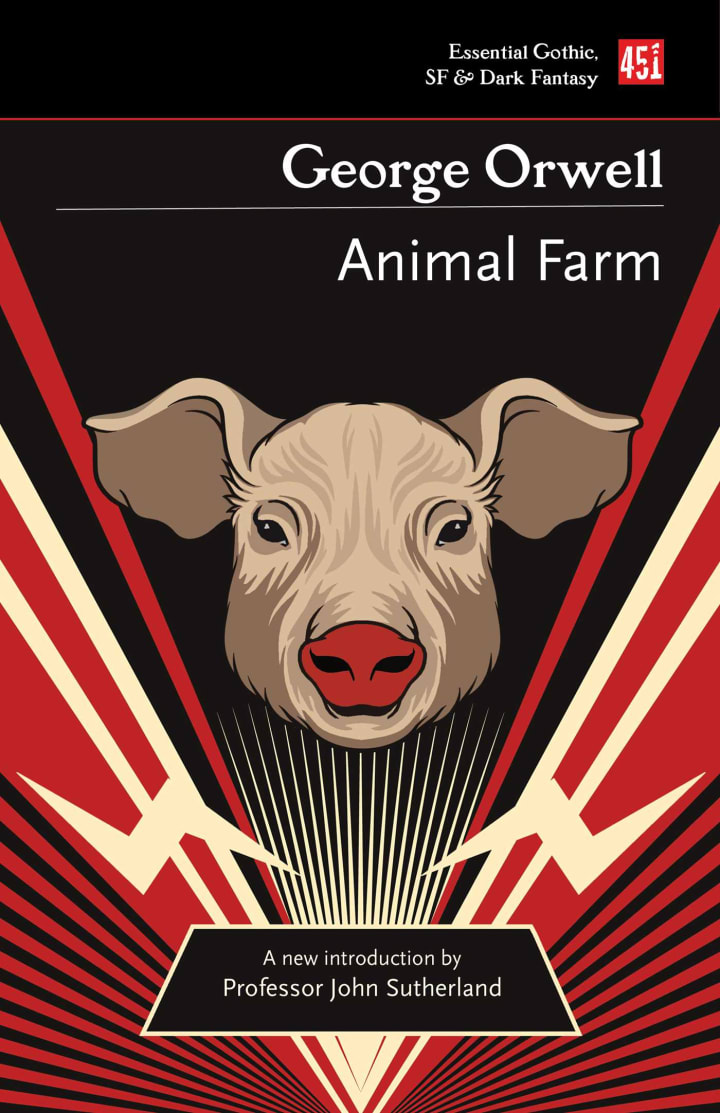Animal Farm by George Orwell
Why It's a Masterpiece (Week 6)

Satirical. Allegorical. Unbelievable. How ‘Animal Farm’ by George Orwell escaped the hammer of British censorship in 1945 is seriously beyond me. Orwell first penned the book between 1943 and 1944, the novel taking about three or four months to write and the fact that the UK was in an alliance with the Soviet Union against Nazi Germany at the time did not help. The British holding Stalin in high regard frankly made George Orwell want to vomit and though the book was initially rejected by absolutely every publisher you can think of, it was eventually published. It was then a huge success and transformed the British opinion of the state of the Soviet Union.
The Plot

Old Major is dead. But, before he goes he makes a long speech about working together as animals, not for the mass production humans use animals for. He inspires a singing of the song ‘Beasts of England’ and thus, he is gone. Napoleon, Snowball and the pigs take over the farm slowly then on. Noting themselves as the most intelligent of the animals, they teach the others how to read but only just enough to be able to read the commandments of the farm made by the pigs themselves.
As the pigs begin to seize power, abuse the rules and morph into the very thing they did not want to be, it is clear that the farm is in huge trouble. The rules begin to change: adding clauses that suit the pigs who continuously justify breaking them. Sooner or later there is only one rule left that would create one of the most infamous lines in modern literary history: ‘All animals are equal, but some are more equal than others.’
From show trials to consumption, from famine to destruction, each character and event perfectly aligns to a character and even within Stalinist Russia with Napoleon serving as a greedy and tyrannical portrait of the man responsible for millions of needless deaths all over the country. ‘Animal Farm’ is a devastatingly honest look at the Russia barely anyone cared to see.
Covered in themes of communism and injustice, this book has outlasted so many others on the same subject because of its defiance to be published in an era of war when Britain and Russia were once allies. With the overt satire relative to its characters being representatives for the real world, it is a miracle that we still see it in its true form today.
Into the Book

There are many great themes in ‘Animal Farm’ that not only add to the reading experience but also stand as representatives of the themes encountered in real life by those living under the tyranny of the Soviet Union. The first one (and possibly the most obvious one) I want to cover is corruption. The novel offers not only commentary on how the Soviet Union became corrupted through its bending of socialist ideas, but it also offers a reaction - showing us how the working class would have suffered. The separation between intellectual and physical work becomes larger and larger as it goes from Napoleon and the other pigs teaching the working animals how to read all the way to changing the rules in order for the pigs to get their own way, making excuses for intellect requiring certain liberties that physical work cannot allow. The naivety of the working class animals in the book represent the under-education of the working class people in the Soviet Union and so they do not question what they could not possibly be aware of as they do not expend intellectual labour.
One night at about twelve o'clock there was a loud crash in the yard, and the animals rushed out of their stalls. . . . At the foot of the end wall of the big barn, where the Seven Commandments were written, there lay a ladder broken in two pieces. Squealer, temporarily stunned, was sprawling beside it, and near at hand there lay a lantern, a paintbrush, and an overturned pot of white paint.
Animal Farm by George Orwell
The next theme is perhaps connected to the first one in some ways and it is to do with means and manipulation. Intelligence and manipulation seems to be one of the most intricate themes of the book where the pigs are concerned. The novel shows us that the pigs require more food, drink and liberties because they expend intellectual work (which they depict as more important that physical work to the rest of the animals). But, the pigs are the only animals on the farm that do not produce anything of value and so, they must use their intelligence as a form of manipulation to the others. This means also using this intelligence to abuse them, forcing the rebuilding of the windmill and teaching workplace mantras that will later be recited ad nauseam by the doomed horse, Boxer. Then we have the dogs who are basically as literate as the pigs are. They however prefer to read the commandments more than anything else, suggesting that they play the intellectual role models to the other animals and offering a dangerous look into the personality of obedience without question. This means that both the pigs and the dogs have one thing in common: apart from manipulation and abuse, their intellect proves absolutely useless to the farm itself. It does nothing for the farm’s overall value.
Napoleon, with Squealer and another pig named Minimus sat on the front of the raised platform, with the nine young dogs forming a semicircle round them, and the other pigs sitting behind. The rest of the animals sat facing them in the main body of the barn.
Animal Farm by George Orwell
One of the themes I think is personally really interesting (that I also barely hear anything about when people do read the book) is food and drink. The working class is normally represented by its lack of food and drink, with the intellectual class being represented with plenty. This is true for the novel and definitely adds to the corruption of the socialist ideas that first underlined the text. Whilst understanding that no animal should receive special treatment, the pigs still abuse the system only because they know they can without being questioned. They know that the other animals do not have the intelligence to understand their convoluted reasoning which is entirely made up. This is directly representative of the unfair and completely unsustainable consumption by the ruling class and is only intensified by the reasoning behind it being repetitive and not able to be understood by anyone else apart from themselves.
They tiptoed up to the house, and such animals as were tall enough peered in at the dining-room window. There, round the long table, sat half a dozen farmers and half a dozen of the more eminent pigs, Napoleon himself occupying the seat of honour at the head of the table. The pigs appeared completely at ease in their chairs. The company had been enjoying a game of cards, but had broken off for the moment, evidently in order to drink a toast. A large jug was circulating, and the mugs were being refilled with beer. No one noticed the wondering faces of the animals that gazed in at the window
Animal Farm by George Orwell
Why It’s a Masterpiece

‘Animal Farm’ is not only considered a masterpiece because of its controversial time and nature, but also because of its sheer simplicity. It reads more like a children’s book more than anything else. Alongside the symbolic character names such as ‘Napoleon’ for the tyrannical lead pig, we also have the allegorical nature of them (as Napoleon is representative of Stalin) which adds layers of depth without complicating the language. George Orwell achieves something that a lot of writers only hope to achieve: without over-using words and over-explaining everything, he has given a meaning to the book which is universal. Everyone understands the depth of the text without the requirement for academic language, making the book more accessible and itself, an act of absolute revolution.
Conclusion

In conclusion, ‘Animal Farm’ is a book that is both a protest as a book and a protest within. Orwell creates what is the most famous allegory of the century in a book which tears down Stalin’s regime whilst the leader was still alive. Famed for its brilliance and simplicity, it takes on the role of modern classic and it takes on the power of revolution. Renowned as one of the greatest novels ever written, it takes no time to dig deep into the executions, propaganda, manipulation and sociopathy of the ruling class.
Next Week: The Haunting of Hill House by Shirley Jackson
About the Creator
Annie Kapur
200K+ Reads on Vocal.
English Lecturer
🎓Literature & Writing (B.A)
🎓Film & Writing (M.A)
🎓Secondary English Education (PgDipEd) (QTS)
📍Birmingham, UK






Comments (1)
I taught this in Tokyo, and a student said to me, "Whenever I think of 'Animal Farm,' I'll think of you." I'll take it. Excellent review, and I think we can also talk about language and how Orwell anticipated where we are heading with censorship and manipulative media.